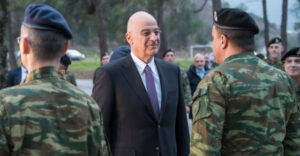The reform at the Ministry of National Defense is being hailed as a government “case study” in recent days, as the significant cost savings achieved under the oversight of Defense Minister Nikos Dendias paved the way for salary increases for the Armed Forces and, eventually, all security forces in the country.
Behind the Scenes
Referred to internally within the Armed Forces as the “Dendias model,” the reallocation of ministry funds reflects a series of unseen synergies across different levels. For more than six months, calculators were “on fire” within the triangle of the Prime Minister’s Office, the Ministry of Finance, and the Pentagon.
The objective was to achieve the budgetary goal without diminishing the operational readiness of the Armed Forces. A key liaison in this coordination effort was Deputy Finance Minister Thanos Petralias, responsible for the General Accounting Office, who quietly developed several potential scenarios. These culminated last week with Prime Minister Kyriakos Mitsotakis giving the green light for salary increases, passing the baton to Minister Dendias for implementation.
The “Savings Fund”
To realize this reform, €260 million in total was required. Funds were sourced from three areas within the Defense Ministry, in addition to €110 million from the state budget, distributed equally across all uniformed personnel: €30 from April 1, 2025 (linked to the minimum wage increase), and €100 from July 1, 2025, through the hazard allowance.
The €150 million needed was drawn from:
- Extraordinary promotions, which significantly reduced the number of high-ranking, high-salaried officers,
- Closure of military camps, due to the New Force Structure plan,
- Expenditure rationalization within the Ministry.
Roughly 60% of the total amount came from internal savings—resources that “cost the Greek taxpayer not a single euro,” according to ministry sources. Notably, the financial outcome of the reform surpassed initial expectations.
A Surplus
According to reliable sources, not only did the Pentagon’s savings cover the required amount for the salary overhaul, but an additional €8 million remains unallocated due to the scale of the rationalization effort. This opens the door for further discussions on future utilization.
Defense Diplomacy
At the same time, the Defense Ministry believes that this tangible focus on human resources will encourage young people to apply to military academies and help stem the outflow of personnel—particularly in the Navy.
Minister Dendias also sees the strengthening of the country’s deterrent power through deepening bilateral defense ties with leading EU nations. In this context, he will travel to Warsaw tomorrow for the EU Defense Ministers’ Summit, and subsequently to the UK to sign a memorandum of cooperation between the Imperial War Museums and the Athens War Museum.
The latter is now integrated into a broader strategy to utilize Ministry of Defense infrastructure as part of “defense diplomacy.” The next step involves collaboration with the United States and South Korea for the commemoration of the Korean War. Parallel talks are also underway with the War Museum in Rimini, where members of Greece’s Sacred Band fought during WWII—including Ziozef Nissim, patriarch of the Italian industrialist family Nissim, whose descendants recently received the Ministry’s “Star of Merit and Honor” medal.
Ask me anything
Explore related questions





